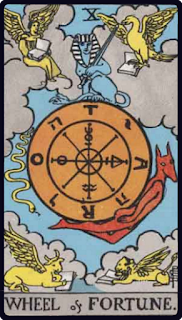
Often mistaken to portend good luck and fortitude, the Wheel of Fortune itself is indifferent representing the neutrality of chance and opportunity. Whilst heavily associated with the concept of luck, the Wheel of Fortune ultimately serves as a reminder that we create our own luck by creating opportunities for the Wheel of Fortune to influence our lives further underpinning the free will paradox and the belief that God’s influence can only be felt by those who are open to receiving it by creating opportunities. We cannot gain or lose wealth without gambling; just as we cannot win or lose in any game without playing.
In the upright state the Wheel of Fortune asks us to consider the elements of uncertainty and capacity for change that exist in our life. Where we seek to change our world or change our situation, we must first create paths to change that open ourselves up to the influence of God or the Universe.
In the inverted state the Wheel of Fortune asks us to consider the elements of certainty and the static nature of our existence. Where the upright state focuses on creating opportunity, the inverted state asks us to consider what works against us by remaining fixed in place. This is our opportunity to consider whether we are being obstinate and holding ourselves back. Much in parallel with Strength where the emphasis was placed on our determination and will, here the emphasis is placed on our flexibility, or lack thereof.
By now you should have realised that many of the cards of the Major Arcana have “twins” that draw parallels with opposing perspectives or subtle shifts dividing their focus; where these cards appear together this is often taken as a sign of internal conflict or cognitive dissonance caused by conflicting desires or conflicting beliefs.
In the Rider-Waite deck the Wheel of Fortune is a fascinating card rich with symbolism. The wheel itself is adorned with the letters T, A, R, O, at the four cardinal points of the compass forming a round, or circular motif perpetually repeating the word T-A-R-O-T-A-R-O-T-A-R-O…
At the four offset cardinal points are four Hebrew letters spelling out YHWH the shortened form of Yahweh, the name of God in Jewish texts. Finally at the centre of the wheel you can see 4 alchemical symbols representing the elements of Earth, Air, Fire, and Water, intersected by a four arm cross representing the balance of all things within the Universe.
Around the wheel there can be found a tetramorph in the form of four grey clouds upon which sit an angel, an eagle, an ox, and a lion, signifying the four heralds of the Book of Revelation and the Book of Ezekiel these heralds represent the authors of the gospels, Matthew, John, Luke, and Mark respectively, each herald is reading a book representing their respective gospels.
In addition to the Judeo-Christian imagery, the Wheel of Fortune is also flanked on the left by a serpent and on the right by Anubis the Egyptian God of the Underworld, with a sphinx sat atop the wheel in repose. These three elements represent life, death, and rebirth, or the pursuit of knowledge, wisdom, and power respectively.
The power of the Wheel of Fortune is further underlined by the spiritual belief that coincidences do not exist within the Universe, everything happens by design and with enough knowledge through causality you can trace every random event back to its cause. Effects do not occur without cause, for every action there is an equal and opposite reaction and conversely for every reaction you can find an action that served as the cause, our ignorance is defined by our incapacity to recognise these causes.
In self-reflection we often take responsibility either for everything or for nothing, we rarely find a natural balance between the two without considered conscious effort. It is important to recognise when situations and elements thereof are outside of our control and relinquish the responsibility, that we may otherwise be inclined to convince ourselves we should hold.
We have a great deal of influence over our own lives but not everything is within our control. Where things outside of our control are affecting our four domains it is worth reminding ourselves that we are not responsible for this impact, our job is only to mitigate it, not to resolve it.
Ask yourself “Did I do that?” or “Can I actually change that?” or in recognition of things we can’t change, ask “What can I do to contain this?”

No comments:
Post a Comment
All comments are moderated before they are published. If you want your comment to remain private please state that clearly.